Artist Pro 14 (Gen 2) Manual
Contents
Introduction
Product Settings
FAQS

Thank you for choosing XPPen Artist Pro drawing display. This user manual is specially designed to detail the product’s functions and features. Please read this manual before using the product to ensure safe and proper use.
Due to the latest product improvements, content may differ from the final product and is subject to change without prior notice.
Note: The pictures in the User Manual are for reference only. The User Manual supplied with the device may vary depending on the model.
Product Overview
Drawing Display

1. USB-A to USB-C port
2. Full-featured USB-C port
3. Brightness +/-
4. Power Key
5. Indicator Light
a. Click the power button to turn it on, and the blue light is steady on, and click the power button again to turn it off.
b. In standby status, the orange light is steady on.
c. In Drawing Tablet mode, long press the power button for 3 seconds, and the blue light and orange light flash alternately. Click the power button again to return to normal mode.
6. Display/Work area
7. Foldable stand
Wireless Shortcut Remote

1. Power Slide Switch
2. Indicator light
In blue status:
a. Flashing slowly: No Bluetooth connected.
b. Flashing quickly: Waiting for Bluetooth pairing.
c. Always on: Successfully paired (Always on for 30 seconds and then off)
In red status:
a. Flashing: Low battery (≤20%)
b. Always on: Charging
c. Off: Fully charged.
A purple color indicates that the red and the blue indicator are both on simultaneously.
3. Roller
4. K11 Roller switch key (Long press for 6 seconds to enter Bluetooth pairing)
5. USB-C Port
6. Shortcut Key Group
Four customizable groups of 10 keys each for a total of 40 shortcut keys. You can disable them if you don't need them. One group is enabled by default, and K1 is the toggle key. Click to switch between key function groups.

Default Key settings without the driver:
K1-Ctrl+O
K2-Ctrl+N
K3-F5
K4-Shift
K5-Ctrl
K6-Alt
K7-Ctrl+S
K8-Ctrl+Z
K9-Space
K10-Ctrl+Shift+Z
Default Key settings with the driver installed:
K1-Key group switching
K2-Set preview
K3-F5
K4-Shift
K5-Ctrl
K6-Alt
K7-Ctrl+S
K8-Ctrl+Z
K9-Space
K10-Ctrl+Shift+Z
* All descriptions and pictures shown are for reference only and may differ from the actual products.
Included with your product
Drawing Display
X3 Pro Smart Chip Stylus
Pen Case
Pen Nibs
Power Adapter
USB-C to USB-C Cable
USB-A to USB-C Cable
USB Extension Cable
Wireless Shortcut Remote
Bluetooth Receiver
Cleaning Cloth
Gloves
Quick Guide
Connection
Drawing Display
1. Computer Connection
Please connect the computer and the drawing display via the USB-C to USB-C cable. If the drawing display does not light up, please connect the drawing display via the USB-A to USB-C cable to the power adapter for power supply.


2. Smartphone connection: Visit the XPPen website for compatible models
a. Connect the drawing display to your device directly with the USB-C cable.
b. Connect the power adapter to your device with the USB-A to USB-C cable.

Wireless Shortcut Remote
1. Wired Connection
Connect Wireless Shortcut Remote to your computer using USB-A to USB-C cable.

2. Wireless Connection
A. Connection to the Bluetooth receiver
Plug the Bluetooth receiver into the computer and slide the power switch of Wireless Shortcut Remote, the indicator light of the Wireless Shortcut Remote always on in blue. (The blue indicator will be off after 30 seconds.)

B. Direct Bluetooth connection
1. Slide the power switch of Wireless Shortcut Remote and the blue indicator light flashes slowly. Then long press the K11 shortcut key for 6 seconds to enter Bluetooth pairing mode and the blue indicator light flashes quickly. Turn on the Bluetooth on the computer, add Bluetooth device, search for Shortcut Remote and complete Bluetooth pairing by clicking the device name, with the blue indicator always on. The indicator will be off after 30 seconds.
2. Slide the power switch again to turn off.

Support System
Drawing Display:
Windows 7 or later,
macOS 10.12 or later,
Android 10.0 or later(USB3.1 DP1.2),
Chrome OS 88 or later,
Linux.
Shortcut Remote:
Bluetooth receiver or wired connections:
Windows 7 (or later),
macOS 10.12 (or later),
Linux.
Direct Bluetooth connection:
Windows 10 (or later),
macOS 10.12 (or later).
This device complies with Industry Canada licence-exempt RSS standard(s). Operation is subject to the following two conditions:
(1) this device may not cause interference, and
(2) this device must accept any interference, including interference that may cause undesired operation of the device."
This device complies with Part 15 of the FCC Rules. Operation is subject to the following two conditions:
(1) This device may not cause harmful interference.
(2) This device must accept any interference received, including interference that may cause undesired operation.
Driver Installation
To ensure the device works properly, please install the driver before using it.
Please download the driver suitable for your product model from XPPen website (https://www.xp-pen.com).
Notes:
1. Before installing the driver, please turn off all antivirus software and graphics software.
2. Uninstall drivers (if any) for other drawing displays/tablets before the installation.
3. Restart your computer after the installation is completed.
4. For the best performance for your device, we recommend you to install the latest driver.
Windows:
Unzip file. Run the "exe" file as administrator, and follow the prompts to complete the installation.
Mac:
Unzip file. Run the "dmg" file and follow the prompts to complete the installation. Go to System Settings -> Privacy & Security -> Accessibility, please ensure that the PenTabletDriver option is checked; Otherwise, the device and driver may not function properly.

If there is no PenTablet_driver on the list, go to Library -> Application Support -> PenTablet_Driver to add the driver manually.
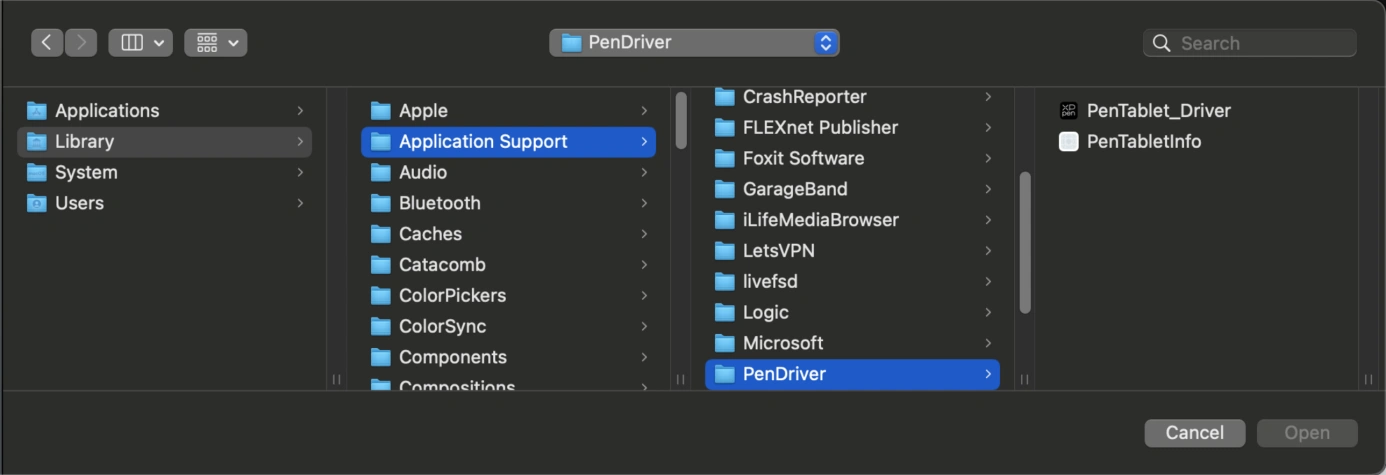
Linux:
Deb: Enter command sudo dpkg -i. Drag the installation file to the window and execute the command;
Rpm: Enter command sudo rpm -i. Drag the installation file to the window and execute the command;
Tag.gz: Unzip file. Enter command sudo. Drag install.sh to the window and execute command.
Introduction to Driver
The driver will run automatically after being installed. If it does not run automatically, go to the driver folder to run it manually.
If the device is not connected or the connection fails, you can see the following prompt. In this case, try to restart your computer or the driver, or contact our service staff for support.
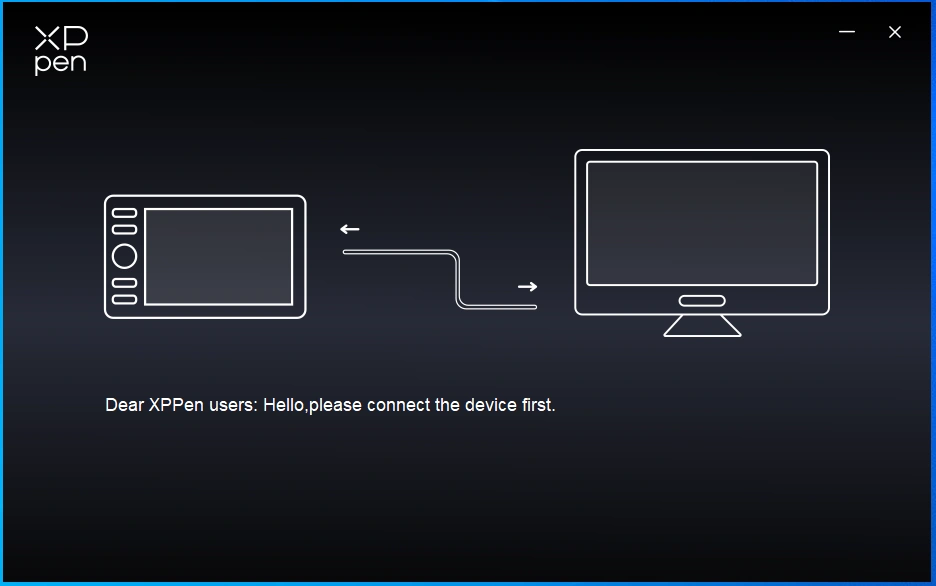
If the device is connected to your computer successfully, the device name will be displayed in the upper left corner of the driver.
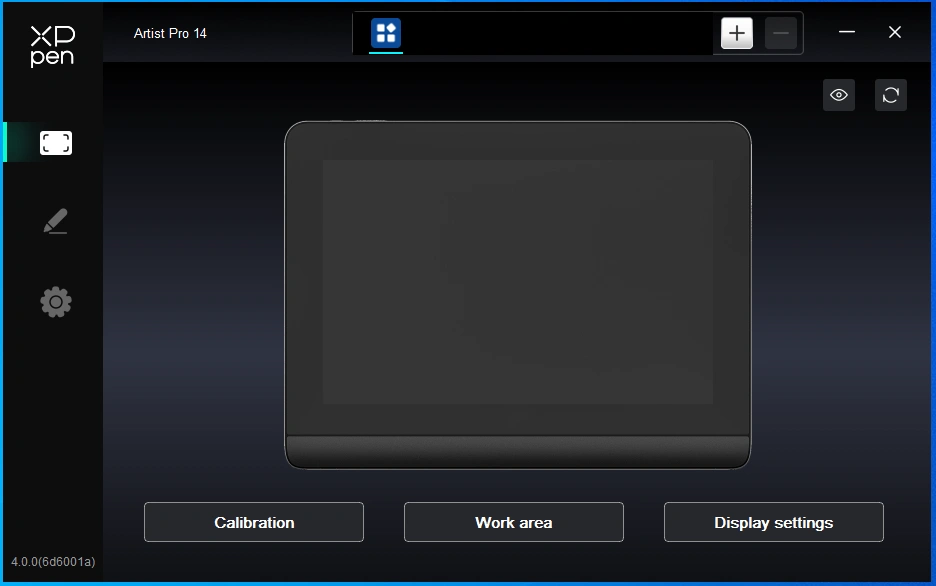
You can connect up to multiple devices via the driver at the same time. Customize a specific device's settings after switching to that device, and all changes made will only apply to that device.
Function settings
Work Area
Go to Work Area and define the mapping between the device's work area and the screen display area.
Screen
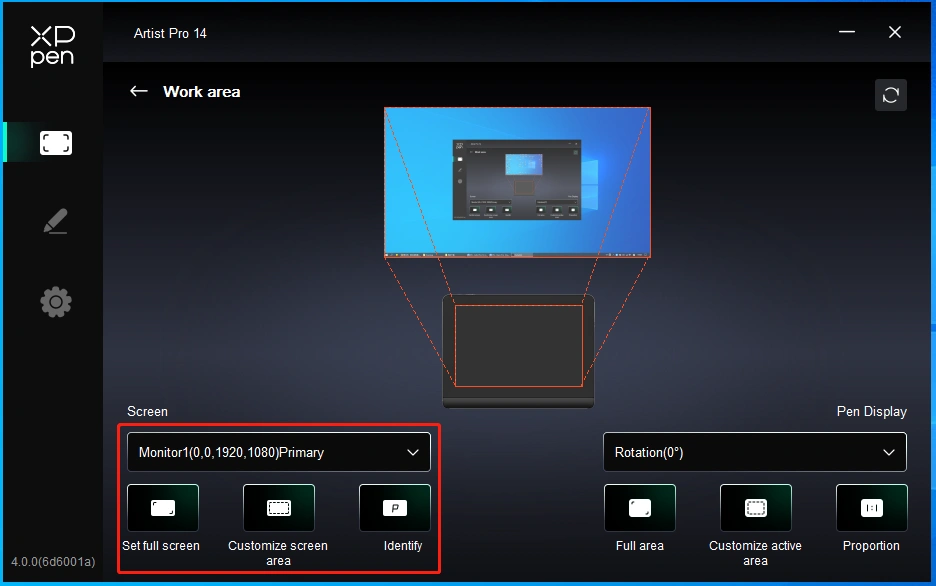
You can set the mapping between the display area of the current screen and the device.
If multiple monitors are used in duplicate mode, the work area of the device will be mapped to all monitors. When the pen moves in the work area, the cursor on all monitors will move at the same time.
If multiple monitors are used in extend mode, go to the monitor tabs to select one of the monitors that the work area of the device will be mapped to. XPPen drawing display is selected by default.
There are two available options to set the screen mapping area:
1. Set full screen: After you select it, the device will be mapped to the whole area of the selected monitor.
2. Customize screen area: There are three ways to customize the screen area:
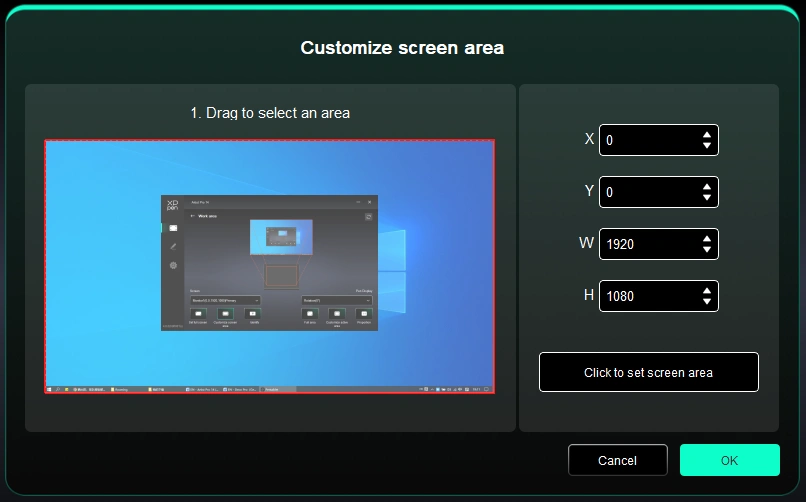
a. Drag to select an area: Drag the cursor from one point to another on the screen.
b. Click to set screen area: Click the upper left corner position and lower right corner position to select on the monitor.
c. Coordinates: Manually enter coordinates in the corresponding input boxes for X, Y, W and H.
Identify:
Identify all connected monitors. The numeric identifier will be displayed in the lower left corner of each monitor.
Calibration:
Hold the stylus in the usual way and click the tip of the stylus instead of the cursor in the center of the red cross on the display to calibrate the offset between the stylus and cursor.
Pen Display
You can set the work area of current device here. The driver enables three ways to set the work area of the device.
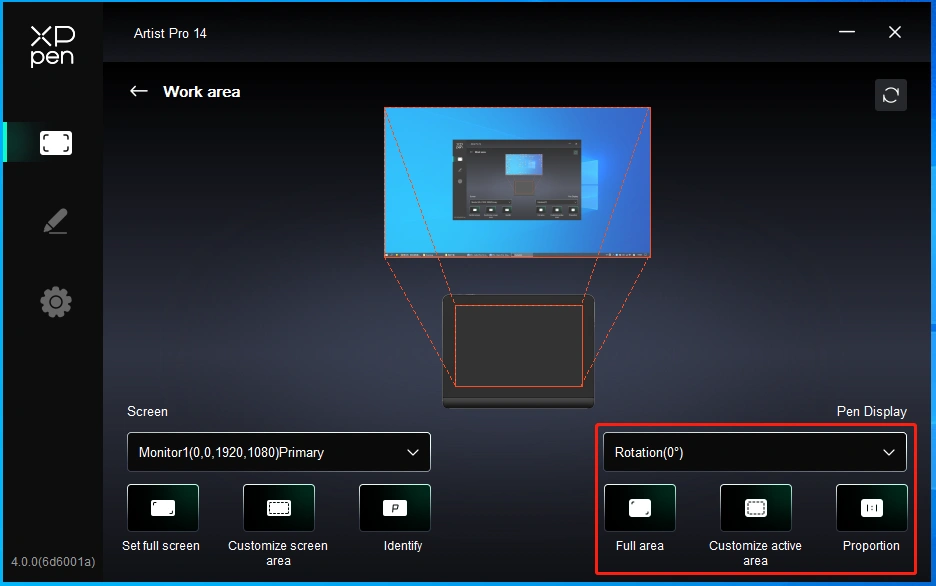
1. Full area: The whole work area of the device is available.
2. Customize active area: There are three ways to customize the work area.
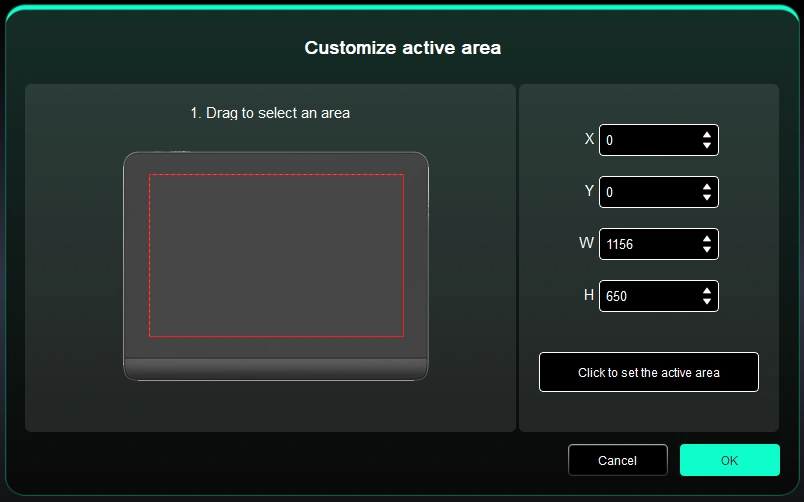
a. Drag to select an area: Drag the cursor from one point to another on the device.
b. Click to set active area: Use stylus to click the upper left corner position and lower right corner position on your device.
c. Coordinates: Manually enter coordinates in the corresponding input boxes for X, Y, W and H.
3. Proportion: Scale your device's work area and selected display area proportionately.
For example: After selecting proportion, if your draw a circle on the device, a circle will appear on the screen, but some part of the work area may not be used. But if you don’t choose the proportion and draw a circle, then the circle may change into an ellipse on the screen.
Connect the device to a 16:9 computer and set it in the copy screen mode. If the cursor is found to be offset, you can select "Screen Ratio" to calibrate.
Rotation:
You can set the device to 0°, 90°, 180° and 270° clockwise for use.
Left-handed mode: Rotate 180°.
Display Settings:
Brightness, Contrast: Slide the corresponding slider to adjust the brightness and contrast.
Color space: In the USER mode, the color space can be customized by adjusting the color temperature (the values of R, G, and B can also be adjusted when selecting USER mode in the color temperature).
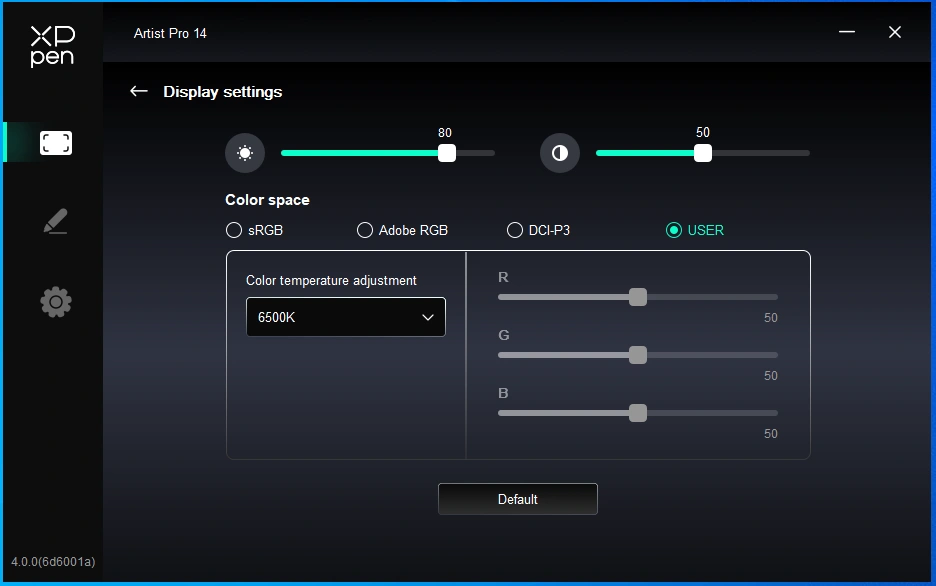
This product has preset three color modes: sRGB, Adobe RGB and DCI-P3. And all modes have been completed accurate and strict color gamut limits and calibration. So you can use it directly without the ICC limit again.
If you want to configure ICC manually, you can select User mode in the display setting option under the driver interface, and configure it under native color.
Application
The driver allows you to set different functions for diffrent applications.
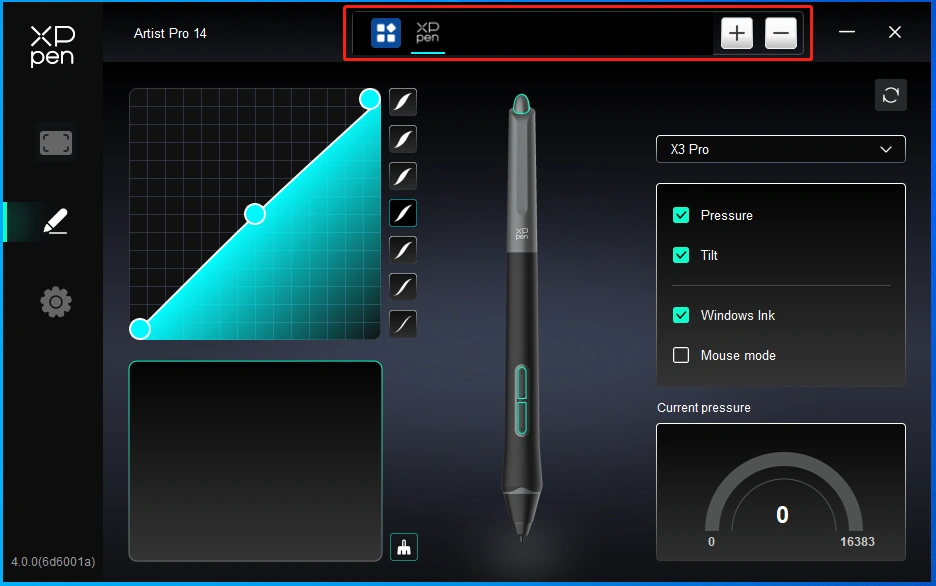
Select an application from the list of applications at the top of the driver, tick the application, and then customize its pen keys, shortcut keys.
1. Click the + icon on the top right of the application bar to open the application list.
2. Select an application to be added from the running applications or click Browse to add from the installed applications.
3. Click "OK" to add the selected application.
4. Select an added application and click the - icon on the top right of the application bar to delete the application.
For example, if you select an application and change its default configuration in the driver, the changes only take effect while you are using that application. When you switch to another application, the driver will automatically recognize the default settings of the other program, and you can add up to seven applications.
If you select all other applications, it will apply to other non-customized applications.
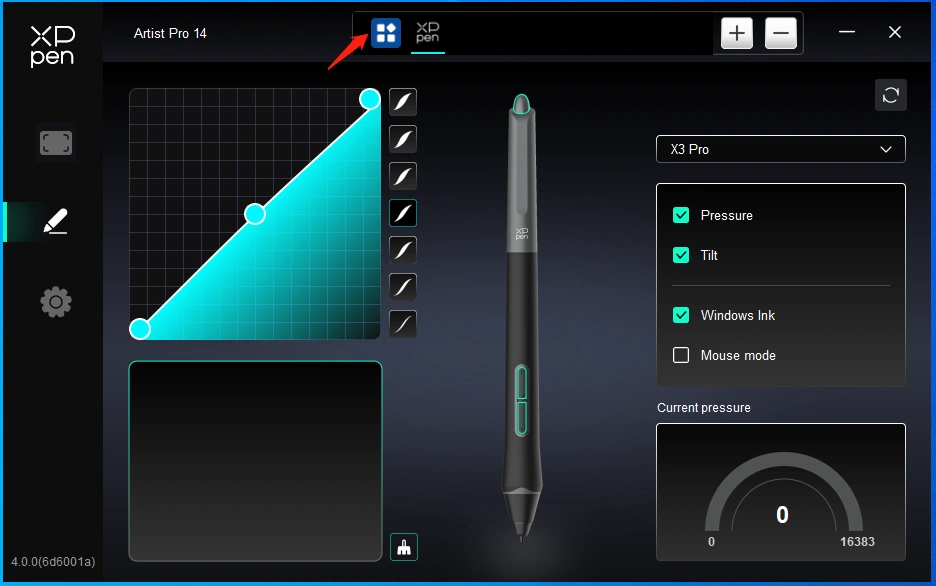
Pen settings
When the stylus is within the work area, the device will recognize the stylus and add it to the driver. The stylus used should be compatible with the device.
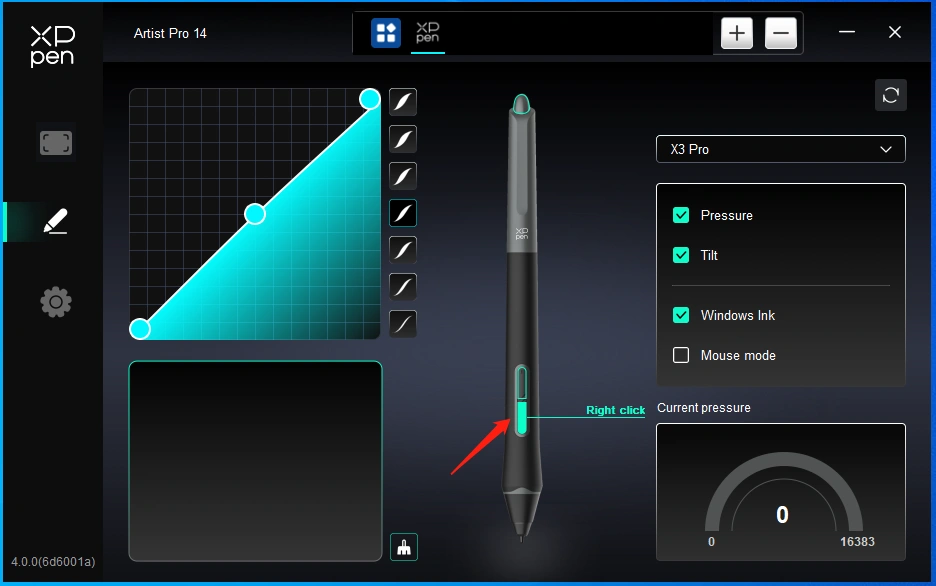
Click on the pen button position on the image to customize its function.
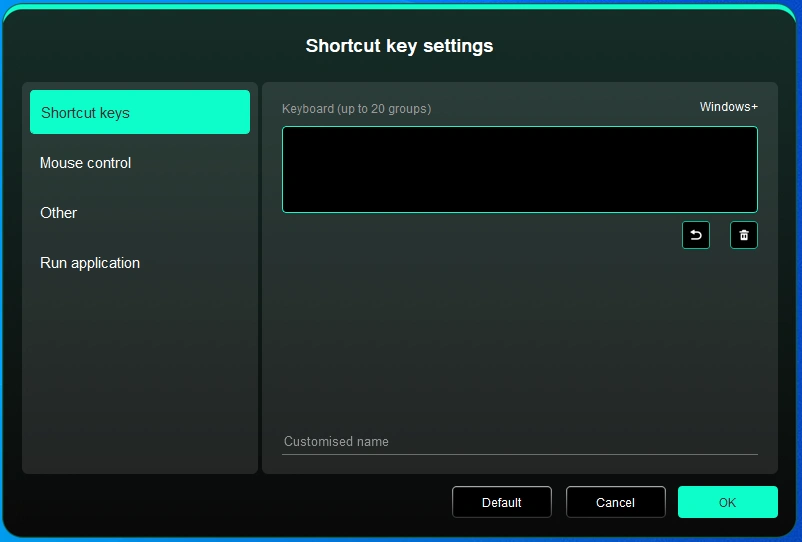
Keyboard:
You can set keyboard shortcut, for example, set it as “Alt+A” in 3D MAX, so the alignment tool can be used.
You can set a combination of multiple keys such as Ctrl+C and Ctrl+V. When you press the combination key, the set shortcut keys will all run once.
Windows (Command): You can add a combination key containing system key, for example: to enter Win (Cmd)+Shift+3, you can press Shift+3 and the driver will bring the system key automatically.
Mouse control:
You can set mouse control and keyboard combination key. For example, if you select Shift and Left Click, shortcut actions are enabled in the software that supports this combination key.
Other- Precision mode:
It limits the work area to a small area. This function allows you to draw more precisely in the area.
Run Application:
Run the selected application.
Customized name:
You can customize the name of the current key settings.
Pressure settings:
By adjusting the "pen pressure" curve or selecting preset pressure options.
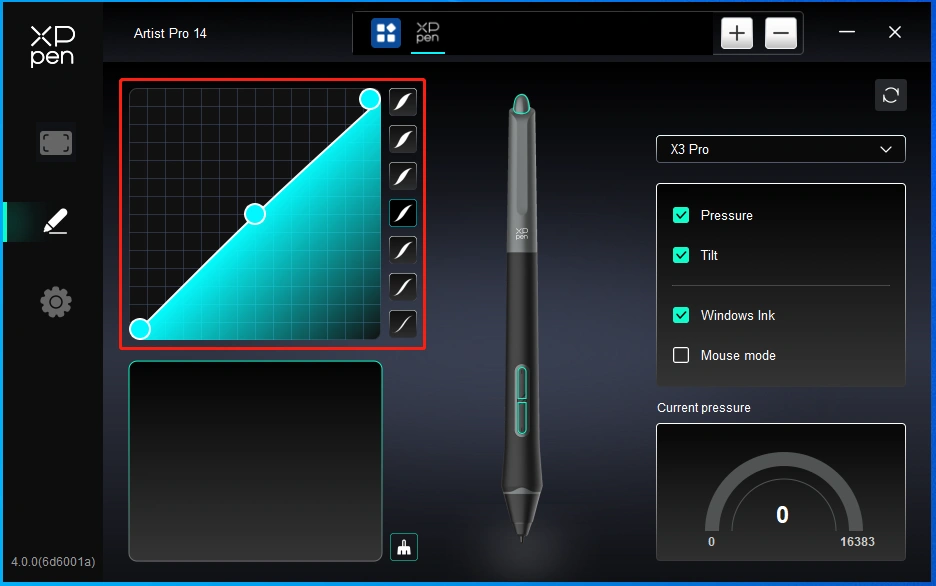
Mouse mode:
When you move your pen out of the work area, the cursor will stay where you leave, which is like operating a mouse. Select the mode and you can adjust the speed of the cursor on your device. If you do not select the mode, the pen mode applies by default.
Windows Ink (for Windows only):
Windows supports the handwriting function. If you need to use this function in Microsoft Office/Whiteboard or other software, do not turn it off.
Driver Settings
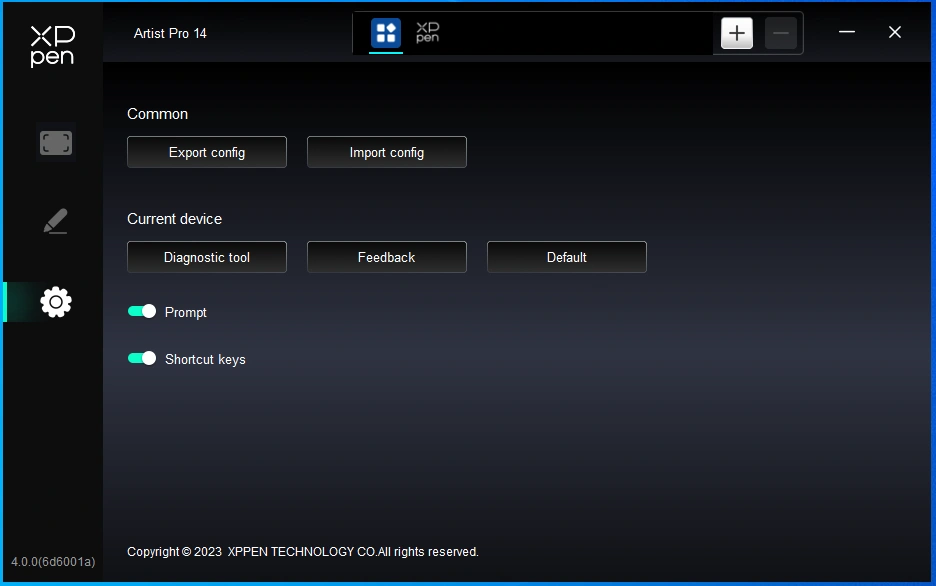
Shortcut Keys:
If closed, disable the functions of all keys of the device.
Prompt:
If closed, when you press a key, no key prompt will be displayed at the bottom of the screen.
Diagnostic tool:
You can use the diagnostic tool in case of any problems while using the driver.
Feedback:
If you have any questions or suggestions during the use of the driver, you can give us feedback through this page.
Import & export config:
You can import/export configurations to save and load their settings.
This function is available for only the same operating system.
Wireless Shortcut Remote
Application
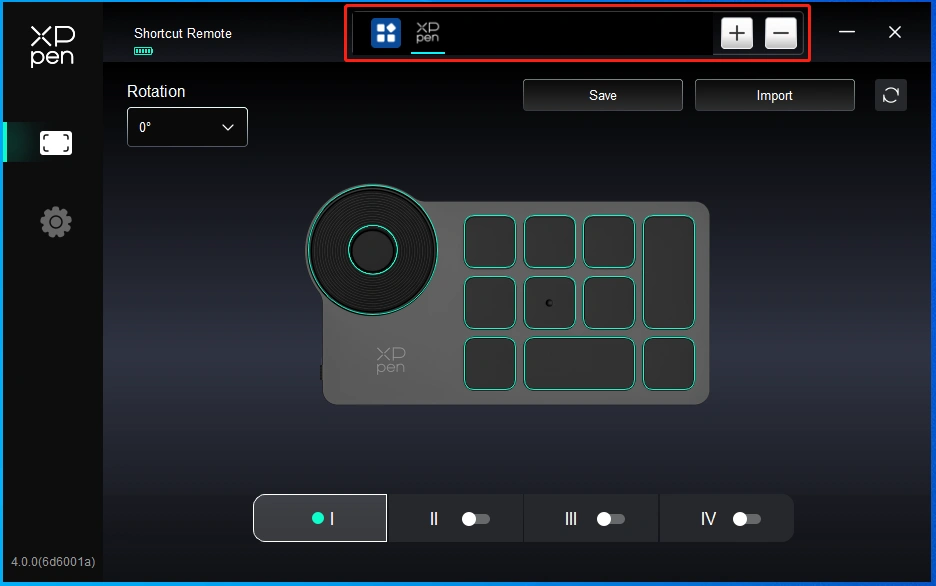
Please refer to the previous text for settings or usage methods.
Roller
Through the key in the middle of the roller, you can switch between the functional groups of the roller.
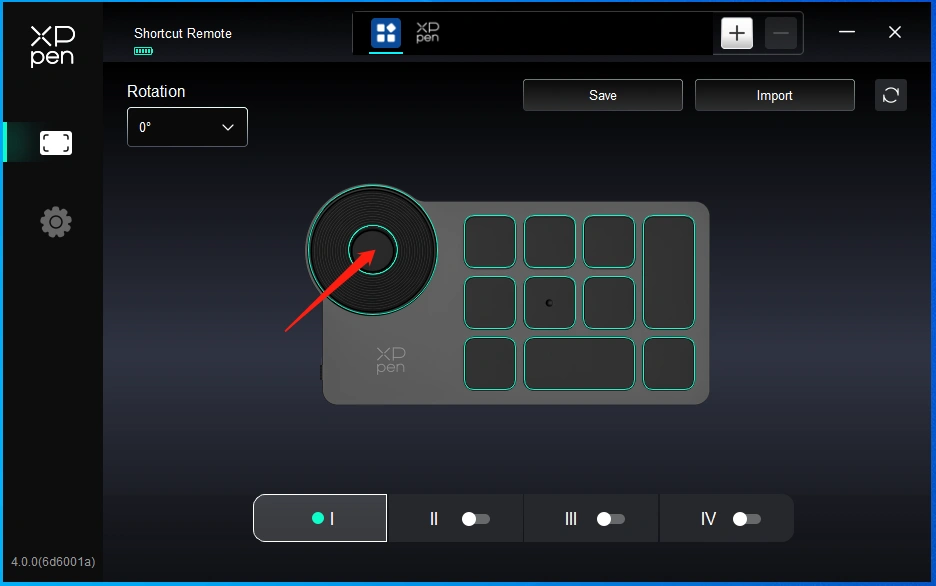
Customized:
Click on the position of the roller on the image, select "Customize" from the preset function drop-down menu, and customize the clockwise and counterclockwise functions of the roller by entering the desired keys or combination keys on the keyboard.
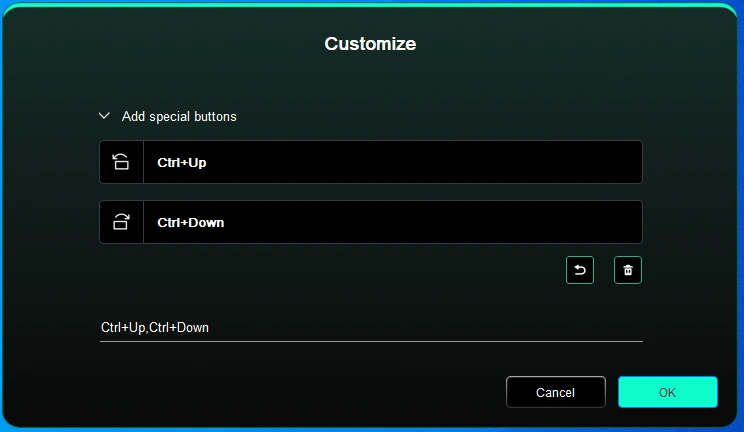
Import/Save
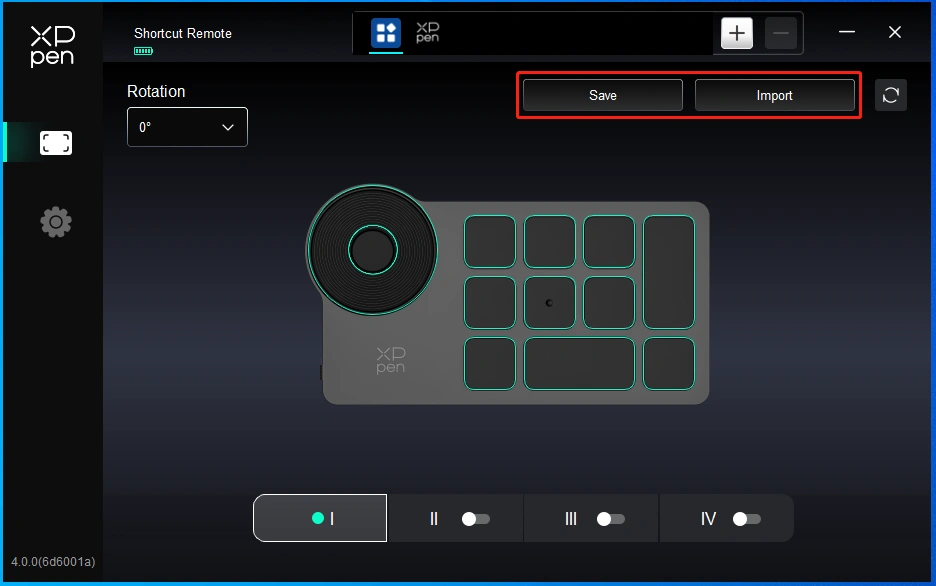
Import:
Import the configuration saved in the device into the driver of the selected application.
Save:
Save the configuration under the currently selected application to the device.
Note: please use the "Import" and "Store" functions in the case of wired connection. The configuration of "Import" and "Store" does not include the rotation information and is only valid under the same system.
Shortcut keys
The driver provides four groups of shortcut keys. The first group of shortcut keys is used by default (cannot be closed). Each group of keys can customize different functions. After enabling, you can switch between the opened groups through "key group switching" (the default is K1 key, which can be customized as other keys).
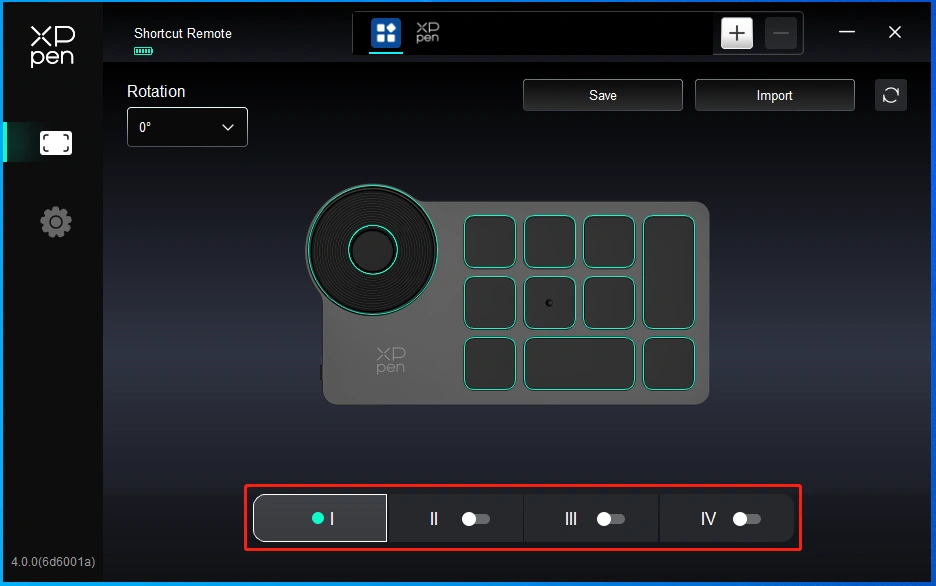
Customize:
Click on the corresponding button position on the device image to customize its function; Please refer to the previous text for settings or usage methods.
Set preview
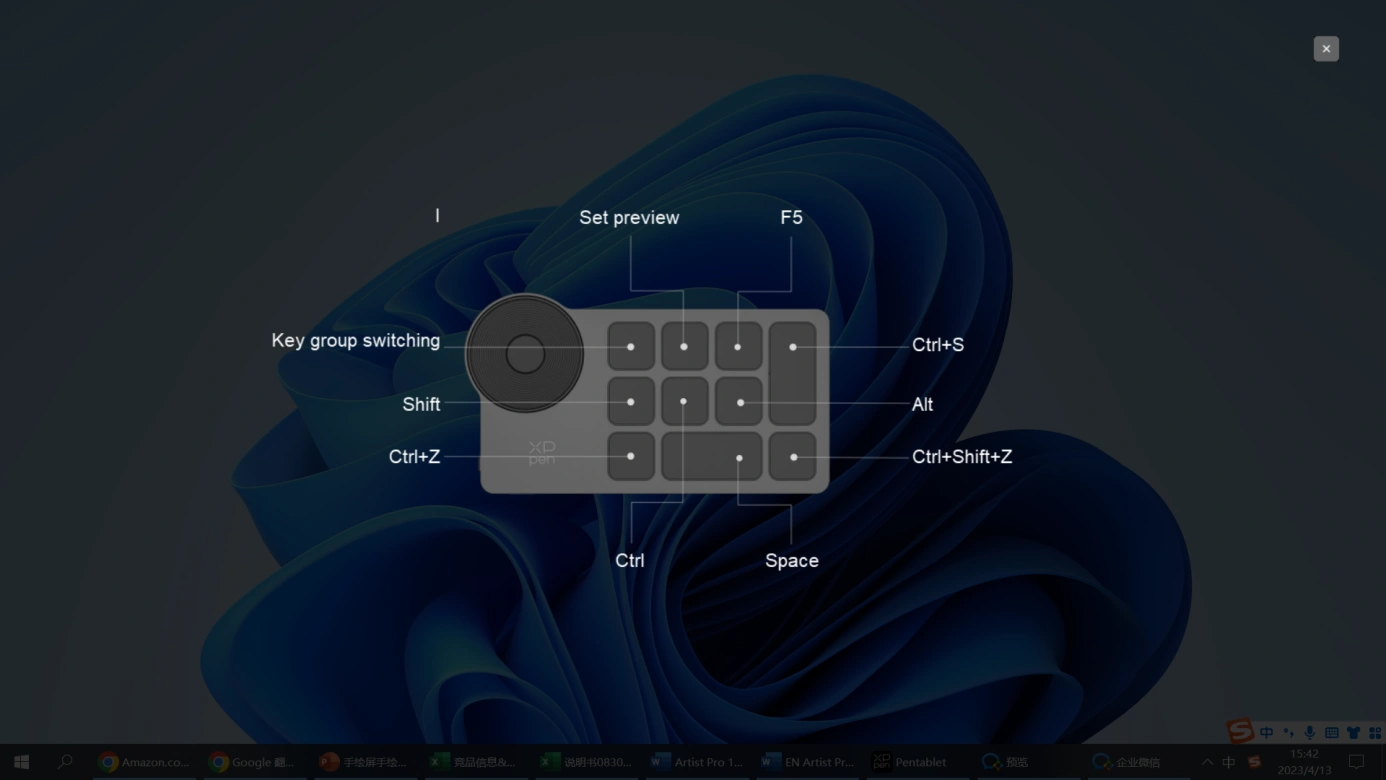
View the key group functions in use, if you select the key group that is not opened in the drive, the group I will be used by default. Click the close button on the upper right to close the window.
Driver Settings
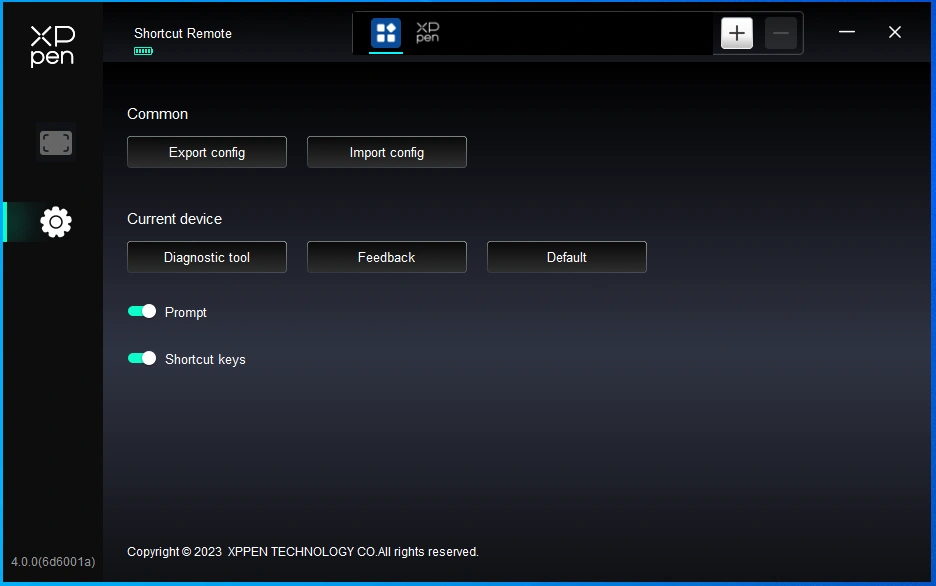
Shortcut keys:
If closed, disable the functions of all keys of the device.
Prompt:
If closed, when you press a key, no key prompt will be displayed at the bottom of the screen.
Diagnostic tool:
If there is any problem while using the driver, you can use a diagnostic tool.
Import & export configuration:
You can import/export configurations to read or save their settings.
This function is available for only the same operating system.
Driver Uninstallation
Windows:
Go to Start -> Settings -> Apps -> Apps & Features, find "Pentablet" and then click "Uninstall" as per prompts.
Mac:
Go to [Go]-> [Applications], find XPPen and then click "UninstallPenTablet" as per prompts.
Linux:
Deb: Enter command sudo dpkg -r xp-pen-pentablet and execute the command;
Rpm: Enter command sudo rpm -e xp-pen-pentablet and execute the command;
Tag.gz: Unzip file. Enter command sudo. Drag uninstall.sh to the window and execute the command.
1. No display or black screen on a drawing display.
a. Check if the device is connected to power supply properly;
b. Check if the cable is connected properly;
c. Check if the power indicator is blue. If not, check the cable and restart the device;
d. If the signal is unstable, check if the cable port is stable.
2. Computer fails to recognize the device.
a. Check if your computer's USB port used works normally. If not, use another USB port.
3. Stylus does not work.
a. Make sure you are using the stylus that originally came with your device;
b. Make sure you installed the driver correctly, and check if the pen settings of the driver are normal.
4. The drawing software cannot sense the pen pressure while the cursor can move.
a. Check if the drawing software supports pen pressure;
b. Download the latest driver installation files from XPPen website and check if the pen pressure is normal in the driver.
c. Before installing the driver, turn off your antivirus software and graphics software;
d. Uninstall drivers for other drawing displays before installation;
e. Restart your computer after the installation is completed;
f. If the pen pressure is normal in the driver (Windows: ensure Windows Ink is enabled in the pen settings of the driver), run the drawing software and test it again.
5. Cursor offsets.
a. Calibrate the pen with the driver.
b. The screen ratio of the product is 16:10. After connecting to a 16:9 computer, the tip of the pen will deviate in the copy screen mode. Please use the screen calibration function in the driver or select "Screen Ratio" to re-calibrate and confirm.
6. Line latency during drawing with the software.
a. Check if the computer configuration (CPU&GPU) meets the recommended configuration requirements for the drawing software installed, and optimize related functions via settings according to the FAQs posted on the official website of the drawing software.
This Class B digital apparatus complies with Canadian ICES-003.
If you need any further assistance, please contact us at:
Website: www.xp-pen.com
Email: service@xp-pen.com
